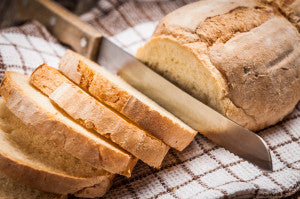By Beth Buck
“Empowering” is not usually a word people use to describe long-term food storage. Usually you see words and phrases like, “wheat,” “rice-and-beans,” and “bland” associated with food storage. Cracked wheat cereal doesn't exactly inspire empowerment. I will grant you there is not a whole lot of excitement to be found at the bottom of a bowl of cracked wheat cereal, but having that 5-gallon bucket of wheat in your basement
is empowering! Here's why:

1)
It allows you to focus on other things. If you are in the midst of a crisis, you don't need to worry about how to feed your family if you have some stored food squirreled away. Nor will you suffer from malnutrition or terrible hunger. Instead you'll have the mental and physical energy to focus on disaster cleanup or establishing communication. Even if you're not in a crisis, you'll be saved trips to the store if you only need to travel as far as pantry to get ingredients for your next culinary masterpiece.
2)
Food storage represents peace of mind. There are thousands of reasons why one would be unable to run to the store to purchase supplies. Famine, war, natural disaster. Food storage effectively negates each of those reasons. And just like that – boom – all your worries about where your next meal is coming from disappear. Don't underestimate the value that peace of mind has for children old enough to be aware of natural disasters and geopolitical instability. My aunt recently told me that when she was growing up during the height of the Cold War, she would occasionally feel a lot of anxiety over the possibility of a Russian attack. During these times, my grandfather would show her their family's food storage and reassure her that their family would be alright. This was a great comfort to her.

3)
Better health. The main staples of food storage – whole wheat, rice, beans, corn, etc. – are naturally nutrient rich, whole foods. Nutritionists have been trying to get Americans to eat a whole food diet for ages. Here's your chance! Store what you eat, eat what you store, goes the old adage. When your food storage is full of legumes and whole grains, you end up eating a lot of whole wheat bread and homemade corn tortillas. It's not even fair to compare that sort of nutrition to what you get from a take-out fast food restaurant. Here's more information about a
whole food diet.
4)
Better finances. Those staples are also a lot cheaper than eating out all the time. If you eat your food storage and rotate it correctly, you'll be compelled to do a lot of cooking from scratch. It's no secret that eating out is exceptionally costly, and the less you do it, the better off you'll be financially. Home cooking is the best way to go. Mark Bittman wrote this
interesting article breaking down the cost back in 2011.
5)
Food storage literally gave us civilization. Fun history lesson: anthropologists say paleolithic hunter-gatherer societies used to spend the majority of their time hunting and gathering food, and that in the literal sense they did not know where their next meal was going to come from. What we call “civilization”
blossomed with the dawn of agriculture, when people were able to grow enough food for long-term storage. Suddenly all that hunter/ gatherer energy could now be spent in other pursuits, such as developing art and coming up with the mathematical prowess necessary to build pyramids. If that is not empowerment I do not know what is.
 Beth Buck has been involved with emergency preparedness since her very earliest years. She enjoys hiking, martial arts, reading, and writing about food storage. Beth lives in the Intermountain West with her family.
Beth Buck has been involved with emergency preparedness since her very earliest years. She enjoys hiking, martial arts, reading, and writing about food storage. Beth lives in the Intermountain West with her family.

 1) It allows you to focus on other things. If you are in the midst of a crisis, you don't need to worry about how to feed your family if you have some stored food squirreled away. Nor will you suffer from malnutrition or terrible hunger. Instead you'll have the mental and physical energy to focus on disaster cleanup or establishing communication. Even if you're not in a crisis, you'll be saved trips to the store if you only need to travel as far as pantry to get ingredients for your next culinary masterpiece.
2) Food storage represents peace of mind. There are thousands of reasons why one would be unable to run to the store to purchase supplies. Famine, war, natural disaster. Food storage effectively negates each of those reasons. And just like that – boom – all your worries about where your next meal is coming from disappear. Don't underestimate the value that peace of mind has for children old enough to be aware of natural disasters and geopolitical instability. My aunt recently told me that when she was growing up during the height of the Cold War, she would occasionally feel a lot of anxiety over the possibility of a Russian attack. During these times, my grandfather would show her their family's food storage and reassure her that their family would be alright. This was a great comfort to her.
1) It allows you to focus on other things. If you are in the midst of a crisis, you don't need to worry about how to feed your family if you have some stored food squirreled away. Nor will you suffer from malnutrition or terrible hunger. Instead you'll have the mental and physical energy to focus on disaster cleanup or establishing communication. Even if you're not in a crisis, you'll be saved trips to the store if you only need to travel as far as pantry to get ingredients for your next culinary masterpiece.
2) Food storage represents peace of mind. There are thousands of reasons why one would be unable to run to the store to purchase supplies. Famine, war, natural disaster. Food storage effectively negates each of those reasons. And just like that – boom – all your worries about where your next meal is coming from disappear. Don't underestimate the value that peace of mind has for children old enough to be aware of natural disasters and geopolitical instability. My aunt recently told me that when she was growing up during the height of the Cold War, she would occasionally feel a lot of anxiety over the possibility of a Russian attack. During these times, my grandfather would show her their family's food storage and reassure her that their family would be alright. This was a great comfort to her.
 3) Better health. The main staples of food storage – whole wheat, rice, beans, corn, etc. – are naturally nutrient rich, whole foods. Nutritionists have been trying to get Americans to eat a whole food diet for ages. Here's your chance! Store what you eat, eat what you store, goes the old adage. When your food storage is full of legumes and whole grains, you end up eating a lot of whole wheat bread and homemade corn tortillas. It's not even fair to compare that sort of nutrition to what you get from a take-out fast food restaurant. Here's more information about a whole food diet.
4) Better finances. Those staples are also a lot cheaper than eating out all the time. If you eat your food storage and rotate it correctly, you'll be compelled to do a lot of cooking from scratch. It's no secret that eating out is exceptionally costly, and the less you do it, the better off you'll be financially. Home cooking is the best way to go. Mark Bittman wrote this interesting article breaking down the cost back in 2011.
5) Food storage literally gave us civilization. Fun history lesson: anthropologists say paleolithic hunter-gatherer societies used to spend the majority of their time hunting and gathering food, and that in the literal sense they did not know where their next meal was going to come from. What we call “civilization” blossomed with the dawn of agriculture, when people were able to grow enough food for long-term storage. Suddenly all that hunter/ gatherer energy could now be spent in other pursuits, such as developing art and coming up with the mathematical prowess necessary to build pyramids. If that is not empowerment I do not know what is.
3) Better health. The main staples of food storage – whole wheat, rice, beans, corn, etc. – are naturally nutrient rich, whole foods. Nutritionists have been trying to get Americans to eat a whole food diet for ages. Here's your chance! Store what you eat, eat what you store, goes the old adage. When your food storage is full of legumes and whole grains, you end up eating a lot of whole wheat bread and homemade corn tortillas. It's not even fair to compare that sort of nutrition to what you get from a take-out fast food restaurant. Here's more information about a whole food diet.
4) Better finances. Those staples are also a lot cheaper than eating out all the time. If you eat your food storage and rotate it correctly, you'll be compelled to do a lot of cooking from scratch. It's no secret that eating out is exceptionally costly, and the less you do it, the better off you'll be financially. Home cooking is the best way to go. Mark Bittman wrote this interesting article breaking down the cost back in 2011.
5) Food storage literally gave us civilization. Fun history lesson: anthropologists say paleolithic hunter-gatherer societies used to spend the majority of their time hunting and gathering food, and that in the literal sense they did not know where their next meal was going to come from. What we call “civilization” blossomed with the dawn of agriculture, when people were able to grow enough food for long-term storage. Suddenly all that hunter/ gatherer energy could now be spent in other pursuits, such as developing art and coming up with the mathematical prowess necessary to build pyramids. If that is not empowerment I do not know what is.
 Beth Buck has been involved with emergency preparedness since her very earliest years. She enjoys hiking, martial arts, reading, and writing about food storage. Beth lives in the Intermountain West with her family.
Beth Buck has been involved with emergency preparedness since her very earliest years. She enjoys hiking, martial arts, reading, and writing about food storage. Beth lives in the Intermountain West with her family.


